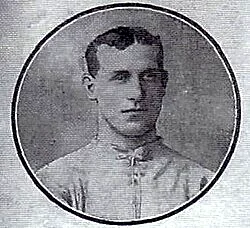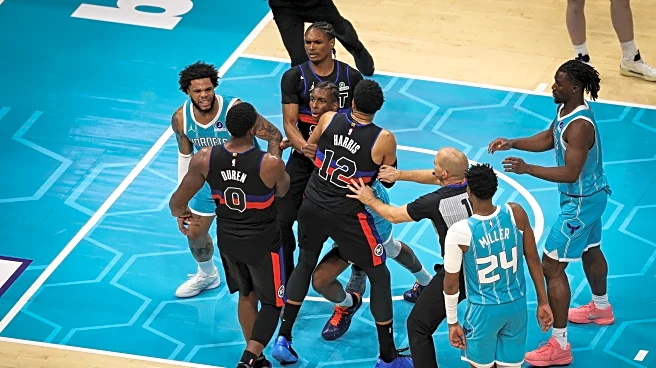1910/11 had been some season to date. Bob Kyle was in his fifth year as manager and was determined to bring the good times back to the then four-times league winners.
He had steered the team close in 1908/09 with a third-place finish, with a squad and style often described as entertaining. But that was not good enough for the footballing pioneer; he wanted titles and trophies as well as the accolades.
The capture of half-back Charlie Thomson, somewhat controversially from Hearts for the 1908/09 season,
was a key acquisition, as was L.R. Roose (1907/08), a goalkeeper and character who would go on to become a club legend. Jackie Mordue, George Holley, and Arthur Bridgett were no less key players and forwards in whom Kyle had high hopes and great faith. To that guile, skill, and craft he had added one of football’s real characters in John ‘Tim’ Coleman for a hard tilt at the title in this campaign.
The Liverpool Weekly Courier had lamented the loss of Coleman and its likely effect on Everton’s season, declaring “there are few cleverer inside-forwards. He is not very big but makes up for his lack of inches by cleverness and pluck. He is also something of a humourist but that is another story”!
I would have loved to have had ‘fly-on-the-wall’ access to the Sunderland dressing room that season, not just full of such renowned footballers, but in Roose and Coleman, two of the biggest jokers and livewires in the game at that time!
Coleman was not just a prankster but also a lead activist in the ‘Players’ Union’.
With the union something of a thorn in the flesh of the Football Association, as they campaigned for better pay and conditions for players, the FA had controversially legislated that players had to sign a pledge to leave the union or face exclusion from the game!
Coleman had led a lively resistance to this measure, which included getting his new team-mates at Sunderland to wear union armbands in protest for the very first game of this season against Newcastle. With over 30,000 fans crammed into Roker Park, Sunderland had won that derby and set the tone for the season, with Coleman scoring the winner.
Coleman and Holley led the goal-scoring charts for the Lads with six goals apiece coming into the Spurs match. With Mordue and Bridgett flying down either wing and Thomson probing and creating from deep, you get a sense of a team that was rampant at this stage of the season.
Spurs had a young debutant named Collins at full-back for this game and arrived at the wrong end of the table and in poor form.
Undefeated and clear at the top of the table, Sunderland had suffered a blow in their previous game. Leigh Roose had suffered a fractured arm half an hour into the game at Newcastle and had to leave the field. With no substitutes at that time, the Lads had played heroically, with Coleman scoring to force the draw against the cup-holders.
(This game proved to be Roose’s last appearance for Sunderland; his loss would prove crucial as the season progressed).
Thomas Allan, a goalkeeper who had been part of the controversial transfer of Charlie Thomson from Hearts a couple of seasons earlier, would step in for Roose.
Centre-half Billy Cringan would make his debut for Sunderland alongside Thomson and Harry Low in an all-Scottish half-back line.
Dreadful weather engulfed Wearside on the day of this game, with dense fog and rain severely impacting the attendance (many spectators thought the game had been or would be cancelled), as well as affecting the playing surface. Conditions were very poor at kick-off.
If Spurs had thought the conditions might be something of a leveller, they were wrong. Sunderland were quickly into their stride and described as playing “in grand style” in the Lloyds Weekly.
With Mordue and Coleman in particular prominent, the young debutant Collins was having a torrid time on his side of the pitch.
Within three minutes and after a number of sorties, Sunderland were in front. Mordue had sped down his wing and fizzed over an awkward-looking cross. Keeper Lunn and full-back Coquet had a moment’s indecision between them and the ball rebounded into the net for the first goal off the hapless Coquet.
To their credit the Spurs defence showed some resistance after this, with Lunn and Coquet breaking up good attacks as the Sunderland forwards looked to turn the screw.
With almost constant pressure on the Spurs goal coming from every angle, it was clear something would need to give. On twenty-five minutes a Cowell shot crashed off the bar and rebounded to Coleman. With swift control, a feint, and a ferocious strike the ball was dispatched to the back of the net for a deserved second goal and Coleman’s seventh of the season.
The atrocious conditions did clear a little approximately half an hour into this game, but the pattern of the game did not change with Sunderland springing forth from every angle and Lunn the Spurs keeper pulling off a number of good saves. Half-time arrived with no further scoring.
The resumption of play saw Spurs dig in for a while and whilst barely troubling the Sunderland defence. On fifty-two minutes a good pass from Gemmell found Arthur Bridgett who sped away down his wing and past a number of defenders. Up to this point he had seen a number of shots either well-saved or go well wide of their mark! From what was described as “an oblique angle” the England international shot and scored the third goal of the game to put Sunderland well in control.
Sunderland’s fourth goal came ten minutes later. Ironically it came from a good bit of defending by the Spurs young debutant Collins, who put a fine tackle in on the flying Bridgett to prevent his progress down the wing. Bridgett though retrieved the ball and set away again, beating two defenders before placing a measured cross invitingly for Coleman and in what was described in the press as “bewildering fashion”, he slalomed through the visitors’ defence and smashed the ball “with aplomb” for his second goal of this contest.
Sunderland then eased up somewhat and Spurs let the game peter out without antagonising their hosts any further.
Billy Cringan was described in the Weekly Courier as having made “a worthy trial”. Charlie Thomson received plaudits for his use of the ball out of defence, Mordue and Bridgett were also honourably mentioned in despatches. It was the two-goal hero Coleman who was awarded player-of-the-match, his goals and all-round display earning him the “coconut”.
Sunderland remained undefeated and top of the league after fourteen games, two points in front of nearest challengers Aston Villa.
The loss of Leigh Roose did prove crucial to the outcome of this season. Thomas Allan and another keeper Bill Worrall were not as good and Sunderland finished the season in third position, well behind champions Manchester United and second-placed Aston Villa.
Tim Coleman was Sunderland’s top goal-scorer that season with twenty strikes. He did not finish the season with the Lads though, transferring to Fulham in April of this season. The arrival of the legend that was Charlie Buchan from Arsenal may have speeded up his exit, but there can be little doubt had he stayed Coleman would have made an even bigger impact.
In his last game for Sunderland at Preston, Coleman scored in a two-nil victory. He played the first half wearing a false moustache, and upon taking the field in the second half was questioned by the referee, who thought Sunderland had introduced a new player (there were no subs allowed at this time)!
The incident sums up a remarkable character who scored goals for every team he played for. He only ever gained one England cap in 1907; reportedly an FA source was alleged to have said that if he had not been “an original member of the awkward squad” he would have gained more.
He scored twenty goals for Sunderland in thirty-two games and 191 goals in 429 top-flight games.
The advent of the ‘Great War’ saw him retire from playing first-class football. He enlisted in the Middlesex Regiment and despite being reported killed in action in 1916, he survived the war, winning the Military Medal for bravery in October 1918.
His time at Sunderland saw him reside at 38 Roker Baths Road, with his wife and two children, as well as three of his team-mates for lodgers (Billy Cringan, Harry Read, and David Main).
The war cut across his time at Nottingham Forest and when he was reported killed-in-action on 29th December 1915, the Forest administration organised a collection at their next game for his wife and two children. Thankfully he was reported “alive and well” by the 31st December – a welcome bit of news for his family indeed to see the new year in!
His long and sustained battle with the FA eventually saw them withdraw their edict that players were not allowed to be members of the ‘Players’ Union’. That organisation grew and evolved into what is now known as the Professional Footballers’ Association.
Tim Coleman’s life and times is captured brilliantly in a book by George Myreson entitled ‘Fighting for Football – From Woolwich Arsenal to the Western Front – The Story of Football’s First Rebel’.
Having survived the war, Coleman went on to play for and manage Maidstone and Tunbridge Wells Rangers (39 goals in 37 games). He also managed very successfully in the Netherlands, winning promotion and the championship with three different teams.
Ironically despite all his activism on behalf of players, he made little money himself out of the game and tragically was killed during the Blitz in London in 1940, working as a labourer.
Despite his short spell with Sunderland in 1910/11 he was obviously embraced by the fans, with the following ode appearing in the ‘Greenun’ as a fan was moved to wax lyrical.
Tim Coleman by WAB
Here’s to Tim Coleman,
A true art-&-sole man;
And one of the best South or Nor’ward.
A trim English laddie;
At football a “daddy,”
Knows all there’s to know as a forward.
A straight-way-to-goal man
Is Comrade Tim Coleman
He don’t weave pattern & figure.
He’s agile & tricky;
The spheroid seems sticky
To Tim and his goal-crop grows bigger.
With Woolwich he toed it,
And other teams “know’d” it;
His brainy manœuvres were noted.
And other clubs angled;
Their golden bait dangled,
And Tim from a red turned blue-coated.
He stayed by the Mersey
Till soon a fresh jersey
Was seen on the form of our hero.
And now there’s no better
By Wear as a netter,
This failing, mayhap he’ll turn Pierrot!
The best inside-right
in the English League.
Write in and ask him the nets he has “busted”.
Three cheers for Tim Coleman!
A top-of-the-pole man.
He’s hotstuff: in brief, Coleman’s mustard!
Division One | Date – 26.11.1910 | Venue – Roker Park | Attendance – 8,000
Sunderland 4 – 0 Spurs (Goalscorers: Coquet OG 3 min; Coleman 25 min; Bridgett 52 min; Coleman 62 min)
Sunderland – Allan; Trougher; Forster; Cringan; C B Thomson; Low; Mordue; Coleman; Cowell; Gemmell; Bridgett.
Spurs – Lunn; Coquet; Collins; Bentley; D Steel; Darnell; Curtis; Minter; Humphreys; R Steel; Middlemiss.
















